Peter MALONE
Saturday, 18 September 2021 19:42
Trackdown
TRACKDOWN
US, 1976, 98 minutes, Colour.
James Mitchum, Karen Lamm, Anne Archer, Erik Estrada, Cathy Lee Crosby, Vince Cannon.
Directed by Richard T. Heffron.
Trackdown is one of many tough action thrillers made during the 1970s. Small-budget, focus on sleazy locations and high action violent drama, this film is considered one of the better examples of its kind.
The film portrays a young woman going from a Montana ranch to try her luck in Los Angeles. She is immediately mugged, abducted, gang-raped by Mexicans. She is then forced into prostitution. Her brother comes from Montana to try to find her and encounters all kinds of obstacles – which, single-mindedly, he overcomes.
The film was a star vehicle for Robert Mitchum’s son James who did not appear in many top-ranking films. Anne Archer was at the beginning of her career. Erik Estrada succeeded on television with CHIPS. The cast also includes Cathy Lee Crosby and a young Ray Sharkey.
Richard T. Heffron made quite a number of films at this period, many of them telemovies.
1. The success of the film as action drama, seventies style, the atmosphere of realism?
2. What was the purpose of this film: in terms of entertainment, moral values and preaching, social message? How well were all these aspects blended?
3. The importance of America in the seventies? The country and mounting contrast with Los Angeles and the big city? Use of colour, locations, the atmosphere of Los Angeles?
4. The way the film sketched in the, atmosphere of the country: Jim and his going off, cowboy style, Betsy and her life in the country, leaving home?
5. The focus of the film on Betsy and her arrival in Los Angeles? Her naivety and the contrast of the exploitive city? The staging of the robbery? Her dependence on Jude, her wariness and yet her love for him? The sexual aspects? Her weakness of character and its being exploited in the rape, her being drugged, being sold? The ugliness of this atmosphere? The fact that it really happens to so many thousands of girls? Audience antipathy towards it and sympathy for Betsy?
6. The world of Tommy Lee and Liz? The sleazy world of the clubs and call-girls? Wealth based on this kind of exploitation? The film's authentic presentation of this? The various go-betweens, in the sale of girls? Johnny Dee’s henchmen etc.?
7. The portrayal of Betsy as willing to be exploited? Liz taking charge of her, buying the dresses, grooming her for hostess and prostitute work? The fascination of the money, the initial reserve about sexuality? Her easy entrance into this way of life? The change in audience sympathy towards her?
8. The lead-up to Betsy’s being bashed? The violence of her injuries and death? Her not being taken to hospital? The consequences for Johnny Dee and his henchmen?
9. The contrast of Jim as sure of himself and yet naive, entering Los Angeles? The prospect of searching for a lost girl, the difficulties in the trackdown? The police and their being overworked. the social workers unable to help? The cowboy methods of Jim? How appropriate for Los Angeles?
10. How important was the character of Lynn? Her busyness at the Centre? Jim’s challenge, her willingness to help him, their relating well? Her attitudes of realism towards the situation, compassion? The contrast with his fascist ways of doing things? How well did they help each other in finding Betsy?
11. The tracking of Jude and persuading him to help? The genuineness of his attraction to Betsy? The details of his helping Jim? The irony of his double-crossing Johnny Dee and leading him to his death? The portrayal of the violence and audience reaction to it?
12. How justified the deaths of the henchmen and of Johnny Dee? The portrayal at length of the heroics in the lift?
The seeming heroics and yet their failure? Jude’s faking of death?
13. The portrayal of the violent climax out in the desert? Was this the only way to handle the situation? Was it too much vigilante and individual administration of justice?
14. How important is a presentation of this kind of story as a warning of vice in our cities? How important the themes of responsibility and the details of ways of acting, and coping?
US, 1976, 98 minutes, Colour.
James Mitchum, Karen Lamm, Anne Archer, Erik Estrada, Cathy Lee Crosby, Vince Cannon.
Directed by Richard T. Heffron.
Trackdown is one of many tough action thrillers made during the 1970s. Small-budget, focus on sleazy locations and high action violent drama, this film is considered one of the better examples of its kind.
The film portrays a young woman going from a Montana ranch to try her luck in Los Angeles. She is immediately mugged, abducted, gang-raped by Mexicans. She is then forced into prostitution. Her brother comes from Montana to try to find her and encounters all kinds of obstacles – which, single-mindedly, he overcomes.
The film was a star vehicle for Robert Mitchum’s son James who did not appear in many top-ranking films. Anne Archer was at the beginning of her career. Erik Estrada succeeded on television with CHIPS. The cast also includes Cathy Lee Crosby and a young Ray Sharkey.
Richard T. Heffron made quite a number of films at this period, many of them telemovies.
1. The success of the film as action drama, seventies style, the atmosphere of realism?
2. What was the purpose of this film: in terms of entertainment, moral values and preaching, social message? How well were all these aspects blended?
3. The importance of America in the seventies? The country and mounting contrast with Los Angeles and the big city? Use of colour, locations, the atmosphere of Los Angeles?
4. The way the film sketched in the, atmosphere of the country: Jim and his going off, cowboy style, Betsy and her life in the country, leaving home?
5. The focus of the film on Betsy and her arrival in Los Angeles? Her naivety and the contrast of the exploitive city? The staging of the robbery? Her dependence on Jude, her wariness and yet her love for him? The sexual aspects? Her weakness of character and its being exploited in the rape, her being drugged, being sold? The ugliness of this atmosphere? The fact that it really happens to so many thousands of girls? Audience antipathy towards it and sympathy for Betsy?
6. The world of Tommy Lee and Liz? The sleazy world of the clubs and call-girls? Wealth based on this kind of exploitation? The film's authentic presentation of this? The various go-betweens, in the sale of girls? Johnny Dee’s henchmen etc.?
7. The portrayal of Betsy as willing to be exploited? Liz taking charge of her, buying the dresses, grooming her for hostess and prostitute work? The fascination of the money, the initial reserve about sexuality? Her easy entrance into this way of life? The change in audience sympathy towards her?
8. The lead-up to Betsy’s being bashed? The violence of her injuries and death? Her not being taken to hospital? The consequences for Johnny Dee and his henchmen?
9. The contrast of Jim as sure of himself and yet naive, entering Los Angeles? The prospect of searching for a lost girl, the difficulties in the trackdown? The police and their being overworked. the social workers unable to help? The cowboy methods of Jim? How appropriate for Los Angeles?
10. How important was the character of Lynn? Her busyness at the Centre? Jim’s challenge, her willingness to help him, their relating well? Her attitudes of realism towards the situation, compassion? The contrast with his fascist ways of doing things? How well did they help each other in finding Betsy?
11. The tracking of Jude and persuading him to help? The genuineness of his attraction to Betsy? The details of his helping Jim? The irony of his double-crossing Johnny Dee and leading him to his death? The portrayal of the violence and audience reaction to it?
12. How justified the deaths of the henchmen and of Johnny Dee? The portrayal at length of the heroics in the lift?
The seeming heroics and yet their failure? Jude’s faking of death?
13. The portrayal of the violent climax out in the desert? Was this the only way to handle the situation? Was it too much vigilante and individual administration of justice?
14. How important is a presentation of this kind of story as a warning of vice in our cities? How important the themes of responsibility and the details of ways of acting, and coping?
Published in Movie Reviews
Published in
Movie Reviews
Tagged under
Saturday, 18 September 2021 19:42
This Earth is Mine
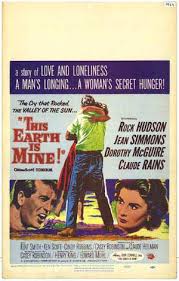
THIS EARTH IS MINE
US, 1959, 124 minutes, Colour.
Rock Hudson, Jean Simmons, Dorothy Maguire, Claude Rains, Ken Smith, Anna Lee.
Directed by Henry King.
This Earth is Mine is the story of an originally French family who settle in California and become celebrated winegrowers. They even prosper during the Prohibition era during which this story is set.
In the 1930s, an English cousin arrives – with the patriarch wanting to arrange a marriage with the heir to another estate and so consolidate the holdings. This is not to happen … which means the proceedings are very interesting in terms of background and winemaking and its history but rather soap-operatic in terms of the big screen colour style of the saga.
Rock Hudson had achieved stardom in the 1950s and was at the peak of his career. He had appeared in such high-class soap operas as Magnificent Obsession, in Giant and was to appear in a series of comedies with Doris Day. Jean Simmons had moved from England at the end of the 1940s and achieved a very successful career in Hollywood, appearing in many of the big-budget films of the 1950s including Young Bess and The Robe. Dorothy Maguire was always a reliable presence in films. Claude Rains, twenty years after his heyday as a villain at Warner Bros in such films as The Adventures of Robin Hood, is the patriarch of the family.
The film was directed by Henry King who had begun as an actor in Hollywood in 1913. He began to direct in 1915 and made countless films during the silent era. He had a successful career during the 1930s with such films as Lloyds of London, In Old Chicago, Jesse James. This continued during the 1940s with such classics as The Song of Bernadette and Wilson. He moved, as did so many directors, to spectacular Cinemascope style in the 1950s with Love is a Many Splendored Thing, Carousel and The Sun Also Rises. This was his third-last film. He was to make Beloved Infidel and Tender is the night, completing his work as director in 1962 (although he was to life another twenty years and died during his sleep at the age of ninety-six).
1. How enjoyable a film was this? The implications of the title - the earth, pride, possession? the people of the United States, an American saga?
2. How important was the migration background of this film? Phillipe – as beau and his arrival in poverty, his ambitions, quarreying an empire and building it up? Grant taking possession of the land? His love for the grapes, his speech and story about the grandmother's vineyard? The implications of families and their cycles and the cycles of history? Philippe as a migrant? Did the film draw out the implications of this theme?
3. How interesting was the prohibition theme? The atmosphere of the thirties, the attitudes to law, action against law, the question of drinking and grapes, waste of grapes and re-ploughing, the attitudes of good and evil towards this, the influence of syndicates and the pressures on farmers etc? What judgment on Prohibition did the film make?
4. What was the main interest of this film? The earth and vineyards theme or the family encounters? What was the attitude of the screenplay itself?
5. How interesting was the Rambeau family? the explanation of its origins, lust for power, the good which was achieved? the bad, the vandals, the relentlessness of work, the power and pride of achievement? The destructive elements of character, reputation, snobbery? Comment on the irony of the war for the family.
6. The attractiveness of Elizabeth and her role as central character? The initial hesitation, her background and its explanation? the outsider with whom the audience could identify? seeing the family and its achievement through her? The uncertainty during the credit sequences and the earth as her's at the end? The quality of her love, her love for Andre, relationship with John? Her attitude towards marriage arguments and turning into love? What did she show in her devotion towards her grandfather? The importance of her relationship Andre conversations about love with Andre? The contrast with her passionate attachment to John? Love and hate and causing John to suffer? The implications of her father’s death for her life? The dedication to work? audience sympathies for him?
7. Did the audience like John? How central was he? The explanation of his background and his telling it to Elizabeth? His infatuation with her and his jealousy? His reaction to Prohibition and the council, his advocate in unions and his getting them together? Was he right in capitulating to the syndicates and using a morality which avoided knowing what he did and they were doing? His attitude towards his mother and his future? His grandfather and whether or not he was like him?
8. How was Martha an example of what family wealth and snobbery had done? her ambitions? her frustrations? her married life, serving her grandfather, arranging Buzz’s marriage, interfering with Elizabeth, her bitter disappointment with the will? Could she cope with her future? How realistic a portrayal did Dorothy McGuire? give? Did you think she was pregnant by him? Why did she make him suffer? The dramatic impact and significance of the fight and his injury? The crisis in his life? The will and its benefit for him in building afresh, yet wanting to build like his grandfather? Would he have a successful future?
9. What did the minor characters add to the film and its understanding of human behaviour? Monica and her family relationships, marrying a Jew? Matt's being worked into the film? John's mother and her illness, and her relationships? Francis and his wealth, his relationship with Matthew with Martha, with John?
10. How did the film show the influence of Philippe on the family? His dignity of bearing, speech, going back into the past, his walking amongst the vines, his retiring to the grandmother's vineyard, his reaction to the fire?
11. Should the film have developed more the sequences with the workers, migrant rivalries, the Italian background? Buzz and her using of Italian feelings, Italian household? Luigi, the emotional involvement at home, the fight?
12. What comment did the film make on the servants in the Rambeau family?
13. How interesting was the background of the vineyards, the documentary information given by John? Should they have shown more of the raids and pressures on them to conform and sign the agreement with the unions?
14. What did the film have to say about relationships, emotions, servants, respectability, hypocrisy?
15. How icy were the sequences of the fight between John and Luigi ( with the baby crying in the background), the dramatic impact of the reading of the will?
16. Was the ending convincing? Symbolic? A repetition of the past? Dramatic or melodramatic?
Published in Movie Reviews
Published in
Movie Reviews
Tagged under
Saturday, 18 September 2021 19:42
Tall Story
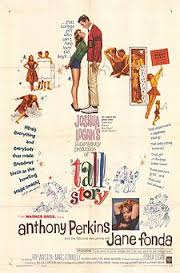
TALL STORY
US, 1960, 90 minutes, Black and white.
Anthony Perkins, Jane Fonda, Ray Walston, Marc Connolly, Anne Jackson, Murray Hamilton, Tom Lachlan.
Directed by Joshua Logan.
Tall Story is a slight romantic comedy of the early 1960s. It is set on an idealised campus where the Americans are to play the Russian visitors at basketball. Interestingly, the film was released a year before Nikita Khrushchev’s tantrums and the building of the Berlin Wall.
Anthony Perkins had just appeared in Psycho and had made his mark in a number of romantic films as well as serious films, with his neurotic personality, in the 1950s. Jane Fonda was introduced in this film and went on to a very successful career, political controversy, marriage to significantly high-flying husbands as well as being an expert on women’s fitness. She won Oscars for Klute in 1971 and Coming Home in 1978.
The film was directed by Joshua Logan whose successes were principally on stage. His films tended to be large, colourful and sometimes cumbersome. This one is a black and white exception. His films include Mister Roberts, South Pacific, Picnic, Camelot.
1. The significance of the title, tone, humour?
2. The conventions of romantic comedy? American romantic comedy? How enjoyable an example, how conventional, better than usual?
3. The American world of 1960? The style of the film: black and white photography, music, songs? Heroes and heroines, university students, romance, ambitions? How different now? the fresh approach, calculated? How naive does it seem now? Nostalgia?
4. The world of the university, study, science, philosophy, the academics, the administration, sport and the coaches, the coverage of sport by television, fans, the status of basketball? How well did the film re-create this world?
5. The topicality of the Russians playing basketball with the Americans?
6. The contrast of the stuffy and academic world with reality? The values of both? Human compromise? The background of academics, the police, gangsters?
7. Anthony Perkin’s style as Ray? The all-American hero, the touch of nervousness? Status at the college, sport, study, admiration for study, taxi work, baby-sitting, romance? His sense of integrity, the money and the bribe, his decision to fail the exam and cheat from June, his confrontation of the difficulty, the exam, the heroism, the courting of June in the caravan, the happy ending and reconciliation? A pleasant American hero?
8. Jane Fonda's first film and her style as June? The all-American girl, her ambitions at university, study, baby-sitting, pursuit of Ray, the caravan, the truth. the reconciliation, the happy ending with the money? An American heroine?
9. The humour with the Sullivans? would this happen to Ray and June? Humanity, stuffiness, comic situations, principles? Charlie and his role at the university, the president, the coach?
10. The humorous sequences, the university life. the sports sequences, the gangsters? An entertaining film? The treatment of typical American values?
Published in Movie Reviews
Published in
Movie Reviews
Tagged under
Saturday, 18 September 2021 19:42
Oct-79
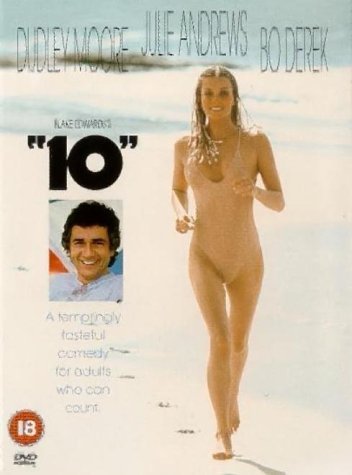
10
US, 1979, 122 minutes, Colour.
Julie Andrews, Dudley Moore, Bo Derek, Robert Webber, Dee Wallace, Brian Dennehy.
Directed by Blake Edwards.
Writer-director Blake Edwards (Pink Panther) has made a broad sex comedy about the male roaring forties - fantasies, temptations and an attempt to face reality - although the Southern Californian setting, with its tendency to the permissive and the way-out, makes the treatment a glamorous fantasy fable for the middle-aged. Small, comic, vulnerable Dudley Moore suits the central role very well (and is given some hilarious Inspector Clouseau-type farcical accidents). Julie Andrews is still sweet and prim in her not-so-proper role and dialogue. Bo Derek heads a supporting cast which makes the most of effective cameo roles, enhancing a film which tends to indulge itself as it makes its point.
1. Significance and focus of the title? Its arresting nature, its reference and application?
2. The conventions of the comedy farce? Sex comedy? Contemporary setting, innuendo, explicit jokes? Audience expectations? The blend of the risque, the fantasy, the real? The permissiveness of Southern California - and the realities of temptation for the middle aged male?
3. The use of Panavision, Los Angeles and Beverly Hills affluent locations, Mexico? The suggestion of the way-out ? especially with George's telescope and his neighbours? The songs, the Henry Mancini score?
4. The blend of the stars and audience expectations of them? Julie Andrews and her prim style, her less proper role and more permissive dialogue? Her singing? Dudley Moore and his comic style, satire, playing the piano? Did they provide a credible duo - especially with Sam's explanation to Hugh of why she loved him?
5. The contribution of the songs and their lyrics, their placement within the screenplay to illustrate characters and themes and moods?
6. The age appeal of the film? Impact for the middle aged, for younger audiences? Masculine appeal, feminine appeal? Observing human nature and the quality of the observations made? Comic observation, serious observation?
7. The focus of the film on George? Dudley Moore and his small stature, English accent, his work as a composer, his cleverness and wit? His friends' assessment of him? The opening with the surprise party for his 42nd birthday and his regrets? His unwillingness to face his age? The bond with Sam? The significance of their long argument in the bedroom about the meaning of 'broad'? Their capacity for arguing instead of loving? Sam's walking out, the comedy of the clashing telephone calls? The irony of George falling down the hill, into the swimming pool to try to get phones? George and his middle-age hang-ups, the sexual urge and his voyeurism with the telescope? The build-up to a crisis so that he could settle down? Sam and her age and her antagonism towards George? Hugh with his homosexual background but offering consolation and wisdom and advice for George? A credible character - at least for the purposes of the sex farce fable?
8. The farcical aspects of the film and the comedy? George being locked out of his own home, stung by the bee, crashing into the police car, falling down the hill, grabbing the phone and going into the swimming pool, getting his teeth filled, drinking the coffee and spilling it, feeling seasick in the plane and at the hotel? The visit to the priest and the antique housekeeper? The effect of punctuating this farce with ordinary laughter?
9. George's vision of Jennifer in the car dressed for the wedding? The impact on him and his driving, the crash into the police car, his hurrying to the church, his going back to interview the priest, going to Jennifer's father and getting his teeth filled, pursuing her to Mexico, glimpsing her in the hotel, watching her on the beach, running over the hot sands, imagining From Here To Eternity-like love scenes with her, idealising her and building up to disappointment?
10. George and his loneliness after the fight with Sam, pursuing Jennifer? His continually ringing Sam and her rejection of him? How was this illustrated in his discussions with Don and his drinking? The woman from the party and his impotence? His building up and enhancing Jennifer, the opportunity of the rescuing of her husband and the TV coverage? The visit, her having a shower, the dinner, the going how, her provocation, the discussion about Ravel's Bolero? The build up to the fulfilment of the affair and the embarrassment of the phone call, the discussion about morals? The effect on her and her not understanding him? The effect on him and his walking out? A credible shattering of his idealism? Enough to make him settle down?
11. How was the change in him evident? his return, the encounter with Josh and the lack of apology, Sam's going out, his playing the piano and her return, the finale? Her refusal to marry him but her thinking it over? Would they have a future together?
12. Julie Andrews as Sam - the background of her marriage, divorce, her son? Her singing and her career? George listening to her as he drove around and the lyrics of her song? Seeing her in rehearsal? The phone calls, the visit to his house, the telescope and her hurt? Her rejection of him and his going to Mexico? Her reaction to his return, her date, the proposal? Her thinking about marriage, the ending?
13. The contrast with Jennifer and her glamour - as seen by George, in bridal white, in the church, becoming an ideal? Her glamour at the hotel? Seeing her through George's eyes then hearing her speak? Concern about her husband, the rescue? The picture of her husband at the wedding., stories about him, floating out to sea, the phone call - a comic view, perhaps, as George saw him? Jennifer on the beach, the visit to her house, the dinner? Her sex talk, 'Bolero', amoral attitudes? The phone call and then the clash with George? The film's stance on Jennifer's moral point of view compared with George's?
14. The significance of the sub-plot about Hugh - his work with George, friendship, homosexuality? His advice to George? The sadness of his own experience - the counterpoint to George and Sam's relationship?
15. The contribution of the cameos and their effect? the priest and his song, his housekeeper, the dentist and his talk, Don and his support of George, the woman in the hotel in Mexico?
16. How much insight via contemporary sex farce - the film indulging itself but making its point?
Published in Movie Reviews
Published in
Movie Reviews
Tagged under
Saturday, 18 September 2021 19:42
Those Dear Departed
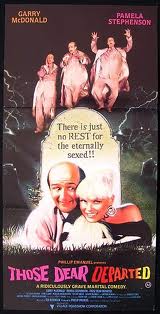
THOSE DEAR DEPARTED
Australia, 1987, 88 minutes, Colour.
Garry Mc Donald, Pamela Stephenson, John Clarke, Su Cruickshank, Arthur Dignam, Jonathan Biggins, Graeme Blundell.
Directed by Ted Robinson.
Those Dear Departed is a comedy written by Steve J. Spears,(The Elocution of Benjamin Franklin) who is also a film actor (Mad Max III, Warm Nights on a Slow Moving Train). It relies on the comic talents of Pamela Stephenson and Garry Mc Donald who obviously enjoy themselves.
The film is a black comedy about a wife who attempts, at first unsuccessfully, to murder her star husband. The film is about ghosts, about hauntings - and has the touch, of course, of Blithe Spirit.
However, the humour depends on the personalities of the stars, some wit, and a send-up musical: Freud - The Musical. The sequences for the musical were filmed in Sydney's Capitol Theatre.
Direction is by Ted Robinson, director of a number of satiric programmes on television.
1. Effective comedy and farce?
2. The cast, the stars and their style? The effect of the combination?
3. The use of Sydney locations, the city, the Capitol Theatre, suburbia, homes, the cemetery, the cliffs and the ocean?
4. The musical score? Mood? The humour of Freud - The Musical and its staging? The satire (in the Ken Russell vein)?
5. The structure of the film: Marilyn telling her story, her appearing within the story, Max’s story, the flashbacks to the past, the group going to Heaven? The finale with the dogs?
6. The popularity of comedy about ghosts? Death and burial, apparitions, the afterlife?
7. Marilyn as amoral, her taping of her story, Pamela Stephenson and her zany nonchalance, the attempts on Max (the phallus, the ground glass, the sniper, the electric shock)? The cover-ups? Her affair with Richard? Adapting her plans to the situations? Her reaction to being thwarted? The poisoned whisky and Norda dying? The car and the telephone call to Max as he died? The relationship between husband and wife, the sex, calling each other 'Bunny' etc.? The satiric touches? The police, the interrogations, her grief, her telling the story about sex and the prurient curiosity of the officer, her seeing the ghosts, her killing the stars of the show, her sequences with Max, falling in love with him after he died? The visit to Max’s mother? Shooting the policeman? The irony of Marilyn's death with the teddy bear and the needle? Max deciding to stay with her? Their reincarnation as dogs and the death of the officer?
8. Garry Mc Donald and his style as Max, the self-absorbed star, the pictures in his rooms, his tantrums, firing people, his performance? The humour of his interpretation of Freud? Escaping death? His becoming paranoid and jealous? The various attempts and his reactions? The possibility of going to Hollywood? The walk in the Domain and his reaction? The sniper? His breakdown? His decision to return? The whisky drink and his timing, Norda's death? The irony of his death in the car with the telephone call? His going to Heaven, the, auditions, the producer, seeing Norda there? The return of the ghosts, haunting Marilyn, falling in love, her confession, at his own funeral? Meeting his father and the flashback to his childhood, his mother's death? The irony of his killing his father and marrying his mother with Freud's Oedipal complex? Pamela Stephenson as his mother? With Norda and her becoming the producer, Marilyn's death, his option to stay, the two dogs?
9. Norda, the gushing agent, her manner and style, her size, suspicious, her death, haunting Marilyn, her taking over of the auditions?
10. Max's father, his unfinished business, going to Earth, drinking, the seeking the teddy bear, in the flashbacks about his death, his deciding to stay?
11. The stars, Max’s jealousy, the dumb girl, the ambitious actor, the wake and telling Marilyn of their suspicions, their deaths, the auditions? Richard as the chauffeur, writing poetry, sexual liaison with Marilyn, his killing himself? His haunting Marilyn, the confession? His meeting the Rocky Horror girl and going with her?
13. The Superintendent and his assistant, questions, their humour, suspicion, watching at the funeral, the aggressive sergeant, the sex story of Marilyn and Richard, Richard hitting the car, his death, return? The dogs and the death of the Superintendent? John Clarke and his comic style as the Superintendent?
14. The producer, his role, people dying, the auditions, his intolerance, the satire?
15. The producer and his prissiness, contact with God, being sacked? Patrick Cook as his assistant?
16. How well did the offbeat idea work? Morality and humour? Black satire? The humorous ending?
Published in Movie Reviews
Published in
Movie Reviews
Tagged under
Saturday, 18 September 2021 19:42
Travels with My Aunt
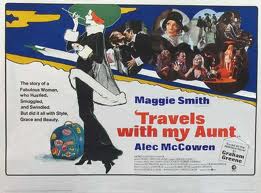
TRAVELS WITH MY AUNT
UK, 1972, 107 minutes, Colour.
Maggie Smith, Alec Mc Cowan, Lou Gossett, Robert Stephens, Robert Flemyng, Cindy Williams.
Directed by George Cukor,.
Travels With My Aunt is 'light' Greene. Graham Greene writes serious novels and serious entertainments. This is one of the latter - the saga of a relic of the twentieth century, Aunt Augusta, still living in a glorious amoral past, still running risks and daring others and her stiff and starchy bank-teller nephew. Involved in swindles and amusing and violent adventures, they travel through Europe and Augusta's memories.
The film is generally a decorous comedy-adventure, with Greene characters rather than Greene dialogue, except for some of the confrontation sequences. It looks sumptuous at times and won an Oscar for sets.
Maggie Smith does a superb caricature of Augusta, mannered and amusing (along the lines of her artificial Oscar winning Miss Jean Brodie, in contrast to her simple Leila Fisher in Love and Pain and The Whole Damn Thing). Alec McCowan? gives a more naturalistic, but very fine performance as Henry. Robert Stephens appears again with his wife, Maggie Smith, as an Italian adventurer. There is a Trent-Hatch? serenade and direction by George Cukor (The Philadelphia Story; Born Yesterday; A Star is Born; My Fair Lady) is excellent.
1. How serious a comedy was this?
2. How much did the film depend on Maggie Smith's portrayal of Aunt Augusta? Why? How convincing was she?
3. What kind of woman was Augusta? What attitudes of hers were we meant to sympathise with, and what aspects of her character were we meant to dislike or like?
4. Were the episodes of the funeral, the urn, the marihuana, in good taste and comic?
5. What kind of man was Henry Pulling?
6. Did Wordsworth contribute much to the film?
7. Why did Augusta want to involve Henry in her life?
8. How did the travels change Henry - for the better?
9. What did this episode of travels do to Augusta? Did she change, did her past catch up with her, her regrets?
10. What motivated the travels? What was the purpose of the comic episode with her French lover and his wife? What did all this reveal about Augusta as a person?
11. Were your surprised when you discovered Visconti was using her? How disillusioned was she?
12. Was this a Graham Greene 'light' entertainment, or was there something more, especially in Augusta - the relic of twentieth century life and the contrast between verve and convention?
13. The film was praised for decor, costumes and as an old style entertainment -do you agree? Was it a good film?
14. The theme of Augusta's travels through her memories: her motherly regard for Henry at the opening? (Did she intend to reveal herself to him?) Her love for Mr Visconti? Any evidence that he loved her? Romance in her memory? The Gare De Lyon, the schoolgirl, leaving the nuns, the dance and serenade? The bordello style and her escorts? Her finally being lost and tired of using people and being used? Her attack on Henry for thinking, doing, being and dreaming nothing (and his response that he had been shamefully used)? What would have happened to her no matter what side the coin finally came down?
Published in Movie Reviews
Published in
Movie Reviews
Tagged under
Saturday, 18 September 2021 19:41
Torn Curtain
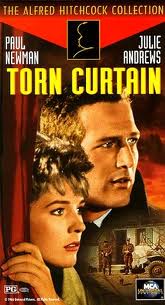
TORN CURTAIN
US, 1966, 128 minutes, Colour.
Paul Newman, Julie Andrews, Lila Kedrova, Tamara Toumanova.
Directed by Alfred Hitchcock.
Torn Curtain was Hitchcock's fiftieth film. Everyone was looking forward to something special and people were, by and large, disappointed with Torn Curtain. This put something of an unfair pressure on the reception of the film which, years later, seems much better than was first thought. In it Hitchcock returns to his espionage interest ( The '39 Steps, Foreign Correspondent and Topaz) while keeping strong elements of his belief in suspense. The killing of Gromek in this film is a classic case of such suspense, after macabre humour, with the problem of audience identification with killing. (This sequence was practically eliminated in the early television presentation of the film.)
Paul Newman, in his only Hitchcock film, follows something of the Cary Grant style. Opinion is divided about the merits of Julie Andrews' performance. The film looks obvious at times and its plot is not very original, but it certainly gives a good idea of Hitchcock's style.
1. Was this a successful and enjoyable Hitchcock film? What did the title mean? What was the impact of the credit sequences - the continuing faces, the use of faces in the fire (an inferno?) and the ominous music? What atmosphere did this create?
2. How successfully did the film create a world of order then plunge into a world of chaos? Was this evident in the structure of the film?
3. Was Armstrong a sympathetic character? Comment on Paul Newman's portrayal.
4. Was Sarah an attractive heroine? What did you think of Julie Andrews performance?
5. How credible is such a spy story? The arranging of all this by American Intelligence? The reality of the flight to Berlin and the defection?
6. The impact of Gromeck's death is considered a high point in Hitchcock's films. Why? Was it unnecessarily brutal? Did the audience participate in this murder because of Michael?
7. What was audience reaction to Sarah's choice to become a traitor?
8. Why are escapes always interesting for audiences? Was this a credible escape? What were the main ingredients for its success?
9. Was the happy ending justified?
10. What comment did the film make about the realities of spying? Or was it merely concerned with being entertainment?
11. How does Hitchcock reinforce audience attitudes towards morality by playing with their feelings, their identification, with hero and heroine in dubious behaviour?
12. How does Hitchcock utilise these moral questions for suspense purposes?
13. The importance of character: Armstrong's status as a scientist credible? Were his goals in being a spy, and a scientist credible? His relationship with Sarah? How genuine was this? How necessary was the deceit? Did it raise any problems in Michael's conscience? Why was Sarah so blind to realities about Michael? (Was the film meant to see Michael for the first part from Sarah's point of view? If so, how effectively done was this?) What was her reaction to finding that Michael was not as she imagined? What challenge did this make to her emotions and her conscience? Her plane ride to East Germany, the impact of the arrival there, the interviews, her having to make some kind of decision to be with him? The audience response to questions of patriotism and conscience? The audience reaction to Michael and to Sarah? Should patriotism predominate over emotional loyalties or not?
14. Comment on the intricacy of the Pi system. How interesting was the presentation of this spying network? How did this add to the suspense? The people who belong to the system in their various professions? The tactics they used to make contact? How central to the film was Michael's interrogation of Professor Lint? Given the fact that he had so little time, how credible was his getting the secret from the Professor? On what weaknesses of the Professor did he play? How successfully? Comment on his conference to the scientists, the irony on the fact that the murder had been discovered. Professor Lint's vanity and curiosity? Professor Lint and Sarah and the softening of the job? The use of the blackboard for the battle of wits between Michael and the Professor? What was the impact of the Professor's realisation of what had happened?
15. From this point how did the film grow in suspense? The need for escape? The physical distance to be covered, the people he contacted, the danger? How well did Hitchcock use suspense tactics?
16. The episode with the bus. Why was this interesting? The people who were in it and the reason why they were there? The woman who objected to the risk? The assistance of all the others? Being chased by the real bus? The hold-ups by the police? The final impact of the dispersing of the passengers and their being shot at?
17. What was the point of the point of the encounter between Michael and the Countess? How ironic was this contact? The fact that she recognised who Michael was? Audience reaction in thinking she was a spy? The pathetic nature of her desperate attempt to get to America? What kind of world did she live in? Were you sympathetic for her? How saddening was the fact that she was left behind?
18. The effectiveness of the ballet sequence, and the way it was filmed - especially the glaring looks of the ballerina? How was this prepared for by the ballerina's earlier appearance on the plane? How dramatic was this sequence? The fact that the hero and heroine are trapped in seats in a crowded theatre and find it difficult to escape?
19. What was your emotional reaction to the call of fire, and the plausibility of escape? How enjoyable was this and what a relief to be free of the claustrophobic effect of the theatre?
20. Did the final play on the cargo on the ship add to the film? Did you think that they were really being shot at?
Published in Movie Reviews
Published in
Movie Reviews
Tagged under
Saturday, 18 September 2021 19:41
Topaz
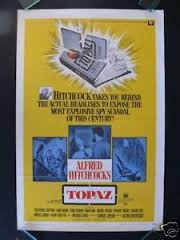
TOPAZ
US, 1969,126 minutes, Colour.
Frederick Stafford, John Forsythe, Dany Robin, Claude Jade, Karen Dor, Michel Piccoli, Philippe Noiret.
Directed by Alfred Hitchcock.
Topaz is a change of style for Hitchcock from the suspense dramas for which he is so well known. On the other hand, Hitchcock has always been interested in espionage. From The 39 Steps, through Foreign Correspondent to North by Northwest and Torn Curtain. Critics, who seem to have pre-conceived ideas about Hitchcock, did not take this into account, and so the reception of Topaz was rather cool. Yet, it is quite an absorbing story based on Leon Uris’ best selling novel about international espionage.
This time Hitchcock' employs a cast which is not so well known to international audiences. His hero, Frederick Stafford, is not a particularly good actor and is stolid beside so many outstanding actors of the French cinema. Hitchcock made the film when he was about seventy years old.
1. Was this an entertaining spy film? Did it retain its interest in characters and incidents and the mystery of Topaz? How?
2. Comment on the effect of the opening sequences in Copenhagen. Did the mood of the film change as it transferred to America?
3. What comment was being made by the character of Michael Nordstrom and his handling of the defection? Is this typical, do you think, of defections and their results?
4. Was the character of Devereaux built-up during the film or did he remain stilted? Why was he a spy?
5. Comment on the relationship between Devereaux and his wife, Nicole.
6. What did the sequences involving the negro Dubois and his interview with Rico Para add to the atmosphere of the film? What particular features of Hitchcock's suspense were in evidence here?
7. How did the change of scene in the film to Cuba change the mood of the film?
8. Did the film give any indication of the real situation in Cuba? Did it provide insight into the political difficulties there?
9. Comment on Hitchcock's techniques in the sequences where the Cuban spies were at work, and their deaths.
10. How did the atmosphere of French politics and spying change the atmosphere of the film? What did it add to the film?
11. What impression did the French politicians make? How was it possible that high ranking officials should be Soviet spies? How well did Hitchcock sketch in the reality of these people in their politics, in France, in their spying?
12. Comment on the sequence where the French official visited Topaz and the audience expected him to be murdered, especially in what he drank. How was Hitchcock manipulating audience expectation? Is this a typical example of Hitchcock suspense and adroit manipulation of audiences?
13. How well done was the resolution? The death of the officials and the breaking of the spy ring?,
14. Why are spy thrillers so popular? Are they meant to be instructive or merely entertaining? Does it matter if they are realistic or not?
15. Comment on Hitchcock's visual technique for impact and mood, e.g. the effect of Juanita's death emotionally and photographically with the blood-coloured dress spread out; the engineering of escapes and Devereaux's leaving Cuba; the role of Francois' sketches for the resolution of the film?
Published in Movie Reviews
Published in
Movie Reviews
Tagged under
Saturday, 18 September 2021 19:41
To Find a Man
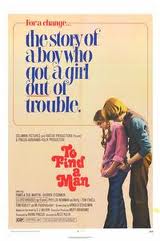
TO FIND A MAN
US, 1972, 89 minutes, Colour.
Darren O'Connor, Pamela Sue Martin, Lloyd Bridges, Tom Ewell, Tom Bosley.
Directed by Buzz Kulik.
To Find a Man was not one of the great impact making films of its day. It generally had only supporting release. Nevertheless it could be quite an important film for study and discussion purposes.
The theme of the film is abortion as it concerns teenagers. The story is simple enough. Girl wants abortion - boy (not the father of the baby) helps. People react. The theme is fairly convincingly portrayed in the story - the school and home background, pressures, uncertainty, help from chemists and doctors, the double standards reaction of a father. With these examples offered to audiences, there are elements for reaction and checking of personal convictions against the behaviour of these characters. The film is excellent in its portrayal of the young man who is the hero. As an example of sensitive selflessness, he is most impressive. The girl, played by Pamela Sue Martin of The Poseidon Adventure is a most convincing, irritating, selfish character.
1. Was this an entertaining film? Why? Did it capture the audience emotionally? What is the significance of the title?
2. Was it in favour of abortion or not? What arguments did it offer - for or against, on the intellectual level, the emotional level? Did it leave the question open?
3. Why did Rosalind get into her predicament? Did she have much sense of responsibility?
4. What were your immediate impressions of Andy?
5. Why did the maid and Andy clash?
6. Why did Rosalind rely on Andy? Did you think Andy was the father of the baby? Why did he decide to help her? He said that he had begun something and had to finish it. Did the audience identify with Andy in his helping of Rosalind?
7. What was the effect of the pregnancy on Rosalind?
8. What was the importance of Rosalind's family in the film? Did they explain her attitudes?
9. Her father's double standards. What comment on the moral standards of American parents is made by the father's reaction to Andy and his change of heart?
10. What were your impressions of the abortionist - Dr. Hargraves? As a man doing his job/ regarding the law? His reaction to Rosalind; to Andy's generosity?
11. What values and moral standards did the film give?
12. How realistic and plausible was the story? How frequently does this situation occur? Did the film give insight into the situation and people's behaviour?
13. The film relied on the impact of visual detail for its message, e.g., the Girls at school, the book during Choir practice, the old wives' tales about abortion; Ros's flirting, Andy's room and clash with the maid; Andy getting the means for the pregnancy test; the hospital and its mean impersonal tone, the negro asking what the bag was fort Andy's being robbed outside the pawnbroker's; Andy's support during the operation; Ros's lack of regard for the unborn child, preoccupation with hair, pain, fears; Andy's crying; the Christmas sequence, especially with Ros's father and double standards.
Published in Movie Reviews
Published in
Movie Reviews
Tagged under
Saturday, 18 September 2021 19:41
These are the Damned/ The Damned
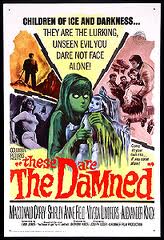
THESE ARE THE DAMNED (THE DAMNED)
UK, 1962, 87 minutes, Black and white.
Mac Donald Carey, Shirley Anne Field, Viveca Lindfors, Alexander Knox, Oliver Reed, James Villiers.
Directed by Joseph Losey.
These are the Damned is one of Losey's "middle period” dramas, that is before being hailed as a great director after The Servant; King and Country; Accident. He attained full recognition with The Go- Between in 1971. These are the Damned is an effective science-fiction film. The credits are eerie, but the film spends some time in establishing its 1960's rock 'n roll, English coast town setting. The theme of nuclear destruction seems the more menacing when set in this contemporary context.
The film was criticised as being too prosaic and filled with cliche in its development of the plot between Simon and Joan. It is, but is justified in view of what happens in the later part of the film. All the issues of the bomb, world destruction and the heartlessness of science are raised and the film's ending leaves an audience with a sense of alarm. It is interesting to note that the film was released in 1962 at the height of the nuclear scares and pre-dated such frightening films as Failsafe; Seven Days in May; Panic in Year Zero and Dr. Strangelove. Losey himself is quoted as saying that the production executives did not like or understand the picture. However, it is interesting and thoughtful science-fiction.
1. Was this a good science-fiction film? Why? Was it plausible?
2. Comment on the effectiveness of the structure of the film - the credits, eerie sculptures and shapes, the cliffs, then the transition to Weymouth 61, the Pier culture, the bikies and the rock music.
3. The realism of Britain in 1960 was built up at some length. How did this help to make the experiment more believable when it was discovered?
4. "The person who knows all the answers is the happier and the more secure" - thus said the head of the project. How right was he? What kind of person was he?
5. Joan and Simon represented ordinary, casual people. How was this illustrated?
6. What was wrong with King?
7. How did King's pursuit of Simon and Joan add pace and excitement to the film?
8. What did you feel when the project was explained to you?
9. Did you share Simon and Joan's reaction to finding the children and wanting to help them escape?
10. Did the children act as children despite their imprisonment?
11. What was the effect of watching the escape and the brutality and fear of the recapturing with Freya?
12. How did you feel at King's death?
13. The world of Weymouth was ugly but is it preferable to the inhuman faith and experimentation of the project?
14. How did the end of the film move you - the couple drifting to death and the calls for help from the empty cliff-face and the sea, the distant view of Weymouth and the cries?
15. What future did the film offer? What hopes?
16. Do you feel that the film communicated its message effectively?
17. The impact of visual techniques for theme, e.g. the bashing of Simon, the restaurant conversation with the head and Freya, Simon's brutal kiss and apology, the placid isolation of the boat, King's breaking the sculpture, the boy's saving King's life, his coldness, Simon and Joan drifting to death, Freya's death from the moving helicopter.
Published in Movie Reviews
Published in
Movie Reviews
Tagged under